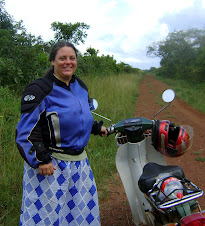 On Sunday I went to a Silver Jubilee 25th Wedding Anniversary Party for Rev. Canon and Mrs. Jonathon Isingoma. When people think of Uganda, they usually think of all the problems we have. However, we also have lots of weddings and joyous occasions too. Ugandan's, like all people, love to celebrate. Great care is taken in dressing and decorating. Brides dream of a western style wedding dress--I even know of one man whose fiance will not marry him in the church until he buys her a fancy wedding dress! Here my friends are celebrating their 25 wedding aniversary in style. I don't know what their wedding was like, but now they have gone all out and are celebrating in style.
On Sunday I went to a Silver Jubilee 25th Wedding Anniversary Party for Rev. Canon and Mrs. Jonathon Isingoma. When people think of Uganda, they usually think of all the problems we have. However, we also have lots of weddings and joyous occasions too. Ugandan's, like all people, love to celebrate. Great care is taken in dressing and decorating. Brides dream of a western style wedding dress--I even know of one man whose fiance will not marry him in the church until he buys her a fancy wedding dress! Here my friends are celebrating their 25 wedding aniversary in style. I don't know what their wedding was like, but now they have gone all out and are celebrating in style. The Thanksgiving for their years of marriage was held about an hour from here in Bulima Church of Uganda. Transport is always a challenge here, but many people got to ride on the lorry (truck) from a local school here. See the picture below:
We had a several hour service including the thanksgiving for 25 years of marriage. When you consider the average life expectancy here (about 47 years as opposed to seventy plus years in the US), 25 years of marriage takes both strong committment to each other and good health.
After the service, we went to the couple's home where they had set up rented tents all beautifully decorated. There was a huge number of  people, and of course many could not get seats under the tent. Then the rain came--pouring down. Everybody crowded under the tents. Ugandans can really pack in closely. I think the only time I have been in a similar crush was in Shinjuku, Japan, where the trains have "pushers" who physically push people into the trains so the doors can close. Under the tent I counted eight people physically pressed against me and we stayed that way for maybe an hour. The eighth person was a little girl--at first I was wo
people, and of course many could not get seats under the tent. Then the rain came--pouring down. Everybody crowded under the tents. Ugandans can really pack in closely. I think the only time I have been in a similar crush was in Shinjuku, Japan, where the trains have "pushers" who physically push people into the trains so the doors can close. Under the tent I counted eight people physically pressed against me and we stayed that way for maybe an hour. The eighth person was a little girl--at first I was wo rried for her in the crowd, but she was relaxed and playing with my purse and had no problems. I managed to snap a photo of her in the crush. After the rains let up, the food was served. The food also was quite good--steamed banannas, beef soup, rice, and beans. (My plate had bananna and beef so I didn't try the rice or beans but my food was very tasty.) Here in Uganda, I was surpised the first time I was served food out of what looked like a trash can--here plastic buckets are a practical way of holding food. In the picture
rried for her in the crowd, but she was relaxed and playing with my purse and had no problems. I managed to snap a photo of her in the crush. After the rains let up, the food was served. The food also was quite good--steamed banannas, beef soup, rice, and beans. (My plate had bananna and beef so I didn't try the rice or beans but my food was very tasty.) Here in Uganda, I was surpised the first time I was served food out of what looked like a trash can--here plastic buckets are a practical way of holding food. In the picture you can see the bucket which had the beef soup. The basket with a bunch of leaves is the bananna which is steamed in plant leaves. It was a very nice celebration, beautifully done and with good food. The rain was a bit of a challenge, but everyone endured it patiently, and it was a good day. Thanks to Rev. Canon and Mrs. Isingoma for a fine party.
you can see the bucket which had the beef soup. The basket with a bunch of leaves is the bananna which is steamed in plant leaves. It was a very nice celebration, beautifully done and with good food. The rain was a bit of a challenge, but everyone endured it patiently, and it was a good day. Thanks to Rev. Canon and Mrs. Isingoma for a fine party.
 people, and of course many could not get seats under the tent. Then the rain came--pouring down. Everybody crowded under the tents. Ugandans can really pack in closely. I think the only time I have been in a similar crush was in Shinjuku, Japan, where the trains have "pushers" who physically push people into the trains so the doors can close. Under the tent I counted eight people physically pressed against me and we stayed that way for maybe an hour. The eighth person was a little girl--at first I was wo
people, and of course many could not get seats under the tent. Then the rain came--pouring down. Everybody crowded under the tents. Ugandans can really pack in closely. I think the only time I have been in a similar crush was in Shinjuku, Japan, where the trains have "pushers" who physically push people into the trains so the doors can close. Under the tent I counted eight people physically pressed against me and we stayed that way for maybe an hour. The eighth person was a little girl--at first I was wo rried for her in the crowd, but she was relaxed and playing with my purse and had no problems. I managed to snap a photo of her in the crush. After the rains let up, the food was served. The food also was quite good--steamed banannas, beef soup, rice, and beans. (My plate had bananna and beef so I didn't try the rice or beans but my food was very tasty.) Here in Uganda, I was surpised the first time I was served food out of what looked like a trash can--here plastic buckets are a practical way of holding food. In the picture
rried for her in the crowd, but she was relaxed and playing with my purse and had no problems. I managed to snap a photo of her in the crush. After the rains let up, the food was served. The food also was quite good--steamed banannas, beef soup, rice, and beans. (My plate had bananna and beef so I didn't try the rice or beans but my food was very tasty.) Here in Uganda, I was surpised the first time I was served food out of what looked like a trash can--here plastic buckets are a practical way of holding food. In the picture you can see the bucket which had the beef soup. The basket with a bunch of leaves is the bananna which is steamed in plant leaves. It was a very nice celebration, beautifully done and with good food. The rain was a bit of a challenge, but everyone endured it patiently, and it was a good day. Thanks to Rev. Canon and Mrs. Isingoma for a fine party.
you can see the bucket which had the beef soup. The basket with a bunch of leaves is the bananna which is steamed in plant leaves. It was a very nice celebration, beautifully done and with good food. The rain was a bit of a challenge, but everyone endured it patiently, and it was a good day. Thanks to Rev. Canon and Mrs. Isingoma for a fine party.
















